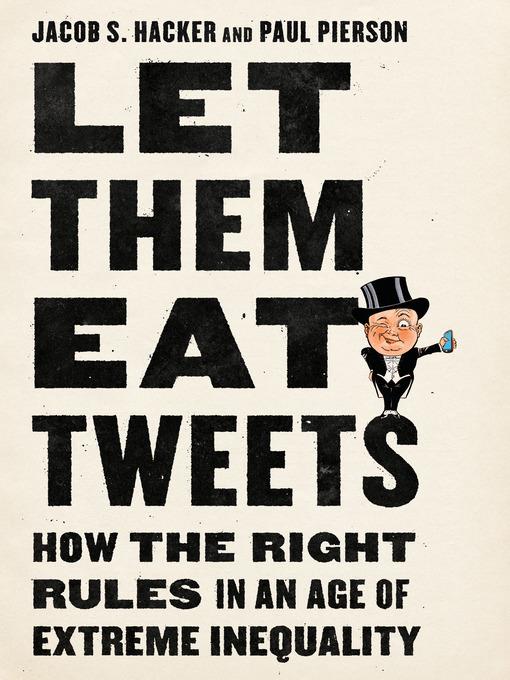
Let them Eat Tweets
How the Right Rules in an Age of Extreme Inequality
کتاب های مرتبط
- اطلاعات
- نقد و بررسی
- دیدگاه کاربران
نقد و بررسی

February 15, 2020
How the Republicans' embrace of economic elites threatens democracy. Political scientists Hacker (Yale) and Pierson (Univ. of California, Berkeley) synthesize many scholarly studies and journalists' reports to mount a compelling, though not groundbreaking, argument that what they call "plutocratic populism"--reactionary economic priorities and right-wing cultural and racial appeals--dominates the Republican Party, undermining democracy. Although Donald Trump is an exemplar of this stance, the authors maintain that Republicans bowed to the ultrawealthy long before the 2016 election. They cite, for example, the 2001 tax cuts, which benefited the rich far more than the middle class and "were sharply at odds with what the majority of voters thought the nation's budget priorities should be." Republicans blatantly covet backing from wealthy supporters, with Mike Pence selected as vice president partly to satisfy evangelicals, partly because of his close ties to big donors, notably the Koch brothers. Over several generations, the party's loyalty to the wealthy caused a shift to cultural issues and outrage in order to attract voters. "The early specialists in outrage-stoking," the authors assert, "were the Christian right and the NRA," which both were fueled by "racial backlash." Increasingly, Republicans have fostered a campaign of "resentment, racialization and rigging" in their pursuit of white voters. In the 2018 midterm elections, however, the party's losses caused it to shift to "a third option": to "make voters' voices less relevant" by turning election rules and redistricting "into finely honed partisan weapons." Democracy itself is a problem for Republicans "because it threatens the property and power of powerful minorities." The interests of those wealthy minorities, the authors warn, "diverge from those of their fellow citizens," making them "more apprehensive about democracy." The authors are cautiously optimistic that shifting demographics may weaken Republicans' power, but only Trump's "decisive electoral defeat" will possibly "motivate a fundamental rethinking of the party's priorities." A cogent and dispiriting contribution to the growing number of analyses of the ailing American democracy.
COPYRIGHT(2020) Kirkus Reviews, ALL RIGHTS RESERVED.

March 2, 2020
Political scientists Hacker and Pierson (American Amnesia) analyze the modern Republican Party’s shift toward “plutocratic populism” in this barbed and cogent account. Contending that all conservative parties within democracies face the same dilemma of how to protect the interests of the “economic elite” while winning electoral support from the masses, Hacker and Pierson document Richard Nixon’s efforts to win over white, working-class voters; Newt Gingrich’s partisan warfare during the Ronald Reagan and George H. W. Bush administrations; the rise of the Koch brothers’ libertarian agenda ; and Donald Trump’s embrace of the “most radical” Republican priorities. They examine the role of evangelical Christians, the NRA, and the right-wing media in Republican efforts to solve the “Conservative Dilemma” despite the unpopularity of their legislative pursuits (repeal of the Affordable Care Act, tax cuts for the wealthy), and note that gerrymandering, restrictive voter ID laws, the Electoral College, and malapportionment in the U.S. Senate help to ensure that conservative voters have an outsized voice. Though much of this will be familiar to politically minded readers, Hacker and Pierson pull disparate pieces into a lucid narrative that goes a long way toward explaining the current iteration of the Republican Party. Liberals will be equal parts enraged and edified by this deeply sourced polemic. Agent: Sydelle Kramer, the Susan Rabiner Literary Agency.

April 1, 2020
Hacker and Pierson's latest (after American Amnesia, 2016) is a standout among recent releases, timed for the 2020 presidential election cycle, that seek to help readers make sense of the often-confusing political climate. Tweets addresses the question of how right-wing Republicans have gained and maintained their power despite the fact that their policies result in extreme?and increasing?economic and social inequality. The authors, both political scientists, find evidence to build their thesis by carefully analyzing recent history. They trace matters back to the presidential campaign of Barry Goldwater, which laid the groundwork for the transformation of the Republican Party from a moderately conservative albeit socially responsive party, to the economic and social conservatism of Reagan, to the extreme right-wing policies of Trump. They then look at how the increasingly right-wing Republicans dealt with the problem of promoting an economic system that concentrated wealth in an increasingly rarified elite that must coexist with a system that gives the ballot, and thus the ultimate power, to the many. The answers the authors come up with are cogent and distressing?and convincing. Highly recommended.(Reprinted with permission of Booklist, copyright 2020, American Library Association.)

























دیدگاه کاربران